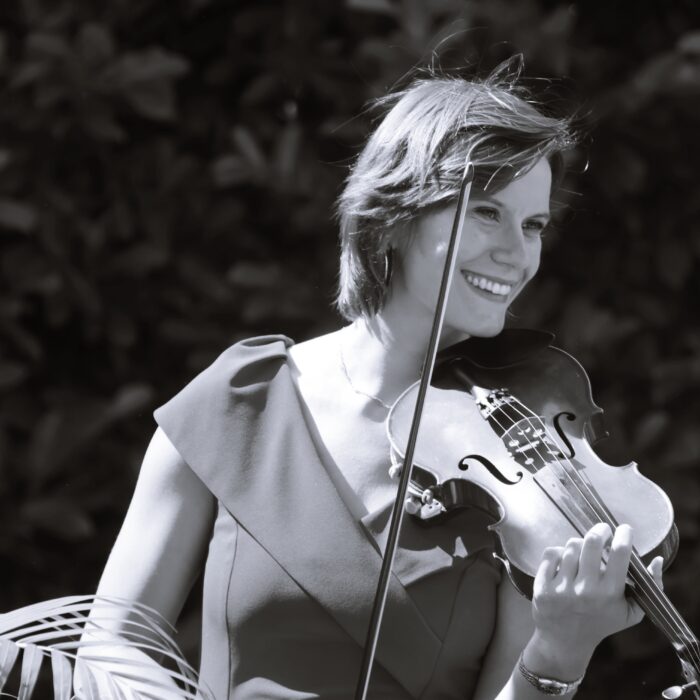
Q & A: Christine Goerke On Singing Isolde and Life as a Wagnerian
By Chris Ruel(Credit: Arielle Doneson)
Hojotoho! Heiaha! When you’re at the top of the Wagnerian world singing Brünnhilde, what could possibly be next? Is there much left in the maestro’s repertoire to challenge a singer’s stamina, musicianship, and let’s face it, fortitude? It turns out that there is something, and it’s Isolde.
After years of preparation, famed heldensoprano Christine Goerke is on the cusp of conquering something she considers a monumental feat. On Nov. 17th, 2019 she will sing Act two of “Tristan und Isolde” in concert with tenor Stephen Gould at Lincoln Center’s Geffen Hall. The performance is part of the center’s annual White Light Festival. The concert takes place on the heels of her run as Turandot at the Met Opera.
Act two of “Tristan” is one of passion as the two lovers rendezvous for a nocturnal tryst. The musical centerpiece is the love duet “O sink hernieder, Nacht der liebe;” a rather traditional operatic duet by Wagner standards. Tristan and Isolde’s liaison is cut short as King Mark and his cadre discover the lovers and swords are drawn. In true tragic form, after inviting Isolde to join him in the realm of night and unite in death, Tristan is mortally wounded by the king before the curtain falls on the sublime, romantically moving act.
OperaWire spoke with Goerke about the upcoming performance and life as a Wagnerian.
OperaWire: Last spring in a New York Times interview you referred to singing Isolde as your “Mount Everest.” What makes the music so formidable? And is Act two particularly difficult?
Christine Goerke: Honestly, it’s less about the music for me and more about the overall character—the combination of her character, the text, and the music. I don’t find the second act to be the most difficult. It’s when it’s in combination with the first act; if that makes any sense. It’s almost as if you talk about “Faust” needing two or three different sopranos. In a way with Isolde, you have two different characters. There’s another side to her that’s completely different, so you see two halves of the same person and that’s reflected in the music.
I have to say, I enjoy the Second act. I was terrified by it because everyone said to make sure you start with Act two, which immediately had me hysterical, thinking, oh, god! I’ll never be able to do it. But really, it’s so lyric and there’s such sparseness—an almost airy quality in the orchestra for so much of the act. It gives you an opportunity to do that rare Wagner whisper, and sing piano which you’re not afforded all that often.
OW: It’s interesting that you say that. I interviewed another Wagnerian, and she said much the same thing about sublime moments in the Ring Cycle. Most people don’t understand that there’s more to Wagner than blaring horns.
CG: When there’s a big orchestra people are expecting, I guess the word bombast is not exactly right; but, it’s that sort of sensation of the sound coming at you and going through you. For me, the really exciting moments are when people have to lean forward on the edge of their seats because they feel like they need to be closer to be part of what’s happening; it’s so intimate. Those are the things that I really like to take advantage of with Wagner. Act two of Tristan gives you so much of that.
OW: How long have you been preparing for this performance?
CG: I’ve been working on it for five years, on and off, though pretty strongly for the last year or so. I’m very glad I left her [Isolde] until the end because I feel like I need everything that I have learned about singing Wagner, about singing with a big orchestra, and about paying attention to the text.
OW: Tell me about singing with Stephen Gould.
CG: We just met for the first time singing a concert at the Proms. I had recordings, and I had heard from friends that I would absolutely adore working with him. Within the first five minutes, when he opened his mouth, I thought, oh, man, I’d better bring my A-game. He is fantastic, and not just a fantastic musician; he is brilliant with the text. He’s such a lovely colleague. I’m so looking forward to doing this with him.
OW: Everything I’ve read about you or seen on social media is that you are well-grounded and down to earth while sitting atop of the Wagnerian world. How do you balance it all working with text and music that is incredibly demanding? I mean, you’ve worked for five years on Isolde.
CG: Well, I keep asking myself that every single day. I’m actually laughing because you were talking about being grounded and I’m sitting here in my sneakers, my jeans, a Gap sweatshirt, and a baseball cap. I was out running errands this morning, getting things for my daughter’s project for school. That’s pretty much what my life is. I’m dealing with an insurance claim on my car because something fell on it during the recent Nor’easter. After that, I’m going to practice “Tristan.” It’s life! I’m a working parent; every working parent does the same thing. And, any parent will tell you that kids will keep you honest.
I came home from performing the “Turandot” Met HD broadcast and my little one went to the theater. I said, what did you think? She said, well, the set was cool, but, sorry, mom, my favorite part was those three guys because they were super fun. I was like, really? Yeah, she said, you were kind of mean and you’re not even in it a lot.
I miss being with my kids when I’m away; that’s the worst part. Wagner takes you away for quite a lot of time; there are long rehearsal periods. So, my kids are getting to be good flyers. My family comes with me when they can and we’re making it work.
OW: Does a singer choose Wagner, or does Wagner choose the singer?
CG: I remember when I was 24 or 25, people were already wanting to call me a Wagner soprano. And, thank God my teachers and my coaches were like, yeah, you’re not right now; you might be. I was so in love with singing classical and baroque music and such a theory geek, I mean like super geek. I would walk into the first day of rehearsal, having written all my own ornaments.
I remember one day, all the sudden, it became apparent to me that I wasn’t going to be able to do this stuff forever. I saw what was coming and I tried to be excited about it, but my heart was broken. It wasn’t that I woke up and said, I’m a singer, I have to sing Wagner. In the end, Wagner absolutely chooses the singer.
You can’t learn to sing Wagner; your voice must be suited to that kind of singing. You can’t learn how to sing loud enough to be heard over an orchestra that is 110 pieces; either that’s what your voice does, or it doesn’t. Now, that said, there are so many voices that can do this; and, there are different sized voices that do it, as well, depending on the house.
OW: So, what advice would you give a young singer who would like to join the ranks of Wagnerians? How do you get to your place within that world?
CG: I tell this to everybody; I totally get it. The music is so amazing. I was in love with the music, but I didn’t necessarily think it was going to be for me, even when other people thought it was.
Have the people whose ears you trust in front of you because there will always be somebody telling you what you want to hear. Surround yourself with the people who will tell you the truth and the truth that you trust, because it’s not necessarily always going to be the thing that you want. I’m grateful that I have been very lucky with the people who have been around me. I tried to keep myself safe and I stuck around in repertoire that I probably should have moved on from; I stayed there a bit too long, thinking it was just too soon, thinking it can’t possibly be time to move on. But it’s different for every voice. So, I can’t say, you know, wait until you’re 36 before you pick up a role. Somebody who is 32 might be ready to look at it. So, the best advice I could possibly offer to someone is just to have people around you who you trust and try things on for size.
OW: You’re doing a quick switch from Puccini’s Turandot to Wagner’s Isolde. It seems like a big change.
CG: Well, if it were not Turandot, it would be slightly more so, but it’s been difficult working on Isolde, especially Act two when Tristan comes in; it’s quite in the middle and low. You have to be super careful about what pieces, what roles you put next to other roles depending on the tessitura. I find that it makes a color change.
OW: Okay, it’s hard to speak with you and not talk about Brünnhilde. How do you keep the role fresh?
CG: Well, it changes every single time I get on stage; productions change, colleagues change. The coolest thing about Wagner is that you’re constantly in a conversation with someone. It’s like if you were doing a stage play. If somebody says a line to you in a different way, your response will come to you in a different way. Every time you work with a different conductor, different things will be brought out in the orchestra. I am such a geek that I study orchestral scores to know which instruments I’m working with. That helps color the text. So, you work with different instrumental soloists and they play it differently, which means you might sing it differently. Honestly, it’s not that hard to sort of change it up every time you do it. And it’s one of the things that I love most about singing through-composed music like this.
OW: Give me your take on what it’s like being part of a specialized pool of singers.
CG: There’s so few of us. Everybody just holds each other’s hands. There’s no ill feeling, no backstabbing; there’s none of that nonsense. We all know that what we do is really hard, so, we’re there to help each other on stage all the time. And, we welcome in anyone who’s crazy enough to try it.



